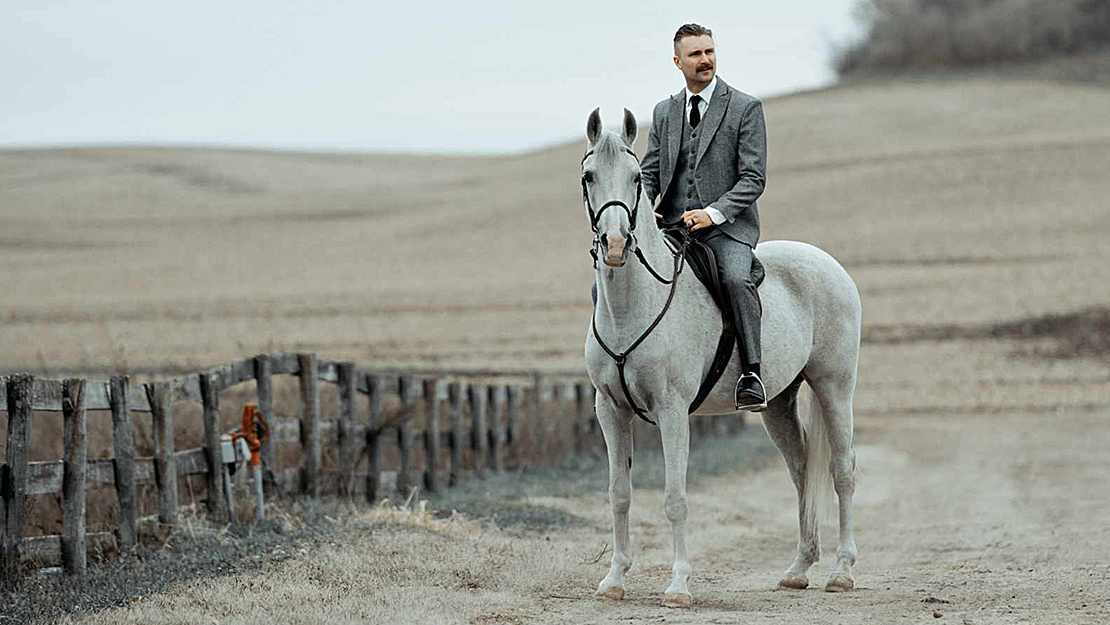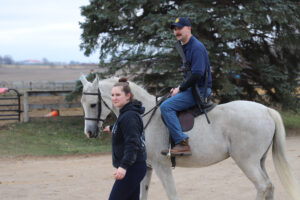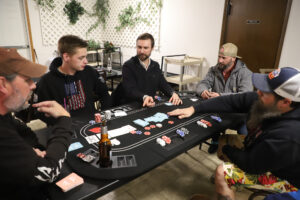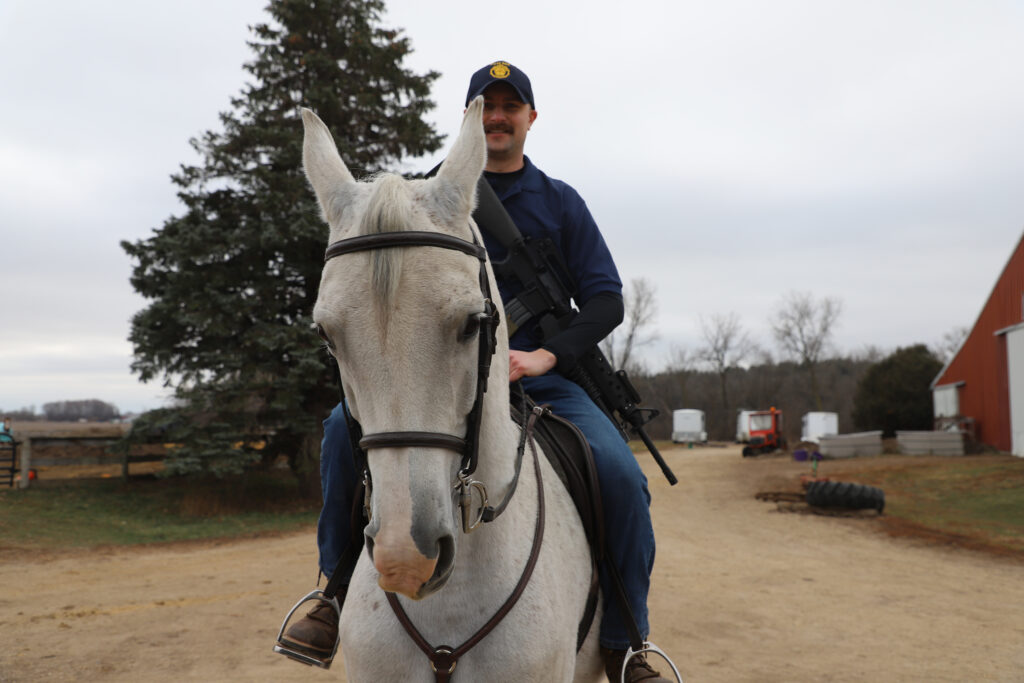Is it easier to return from deployment on active duty or with National Guard?

Meet Eric Baehman, who founded a nonprofit organization to provide ‘range therapy’ for veterans
LONSDALE — Returning from a deployment is never easy. In the active-duty military, servicemembers spend pretty much every day with others who went through what they went through.
In National Guard and Reserve units, they spend most days with civilians who have no idea what the deployment was like.
Eric Baehman knows. He has experienced both. He is a member of Lonsdale Post 586 and is a veteran of the fight against the Islamic State with the 1st Infantry Division and of the War in Afghanistan with the Wisconsin National Guard.
Baehman grew up in Inver Grove Heights and graduated from Simley High School in 2013.
“As a young kid, I knew I wanted to be in the military,” he said. “I played Army as a kid. I like guns, airplanes and history. I was 17 when I told my parents what I wanted to do.”

He left for active-duty Army in February 2014. He requested Special Forces, and he was a qualified candidate for 18X but was denied an age waiver. He landed on 11B, which, as most veterans know, is infantryman — a grunt.
One-Station Unit Training (aka OSUT, a new infantry term combining basic and AIT) was at Fort Benning, Ga. Then the Army sent Baehman to Fort Riley, Kan., to be part of the 1st Infantry Division, better known as the Big Red One. He was assigned to the division’s 118th Infantry Regiment, but near the end of 2014, he became part of the reactivated 2nd Battalion, 70th Armored Regiment. He would be in a tank battalion.
The 1st Infantry deployed to Iraq in September 2015. It wasn’t Operation Iraqi Freedom or Operation New Dawn. Those were over. This was Operation Inherent Resolve, the effort from 2014 to 2021 to fight the militant fundamentalist group termed ISIS, ISIL, Daesh or just simply Islamic State. Its goal was to restore a Caliphate in the Mideast.
Baehman was in Baghdad at first, then the Besmaya Complex southwest of Baghdad. He eventually reached many places like FOB Speicher near Tikrit and FOB Hammer in the desert east of Baghdad toward Iran.
He ended up with a different mission than the soldiers in his unit. A good soldier known for his decision-making and esprit de corps, the brass selected him for a 12-man task force of trainers.
“The military was a good fit for me,” he said. “If you do a good job, people notice.”
They would work with other trainers from other units — SEALs, Marines, Special Forces, 101st Airborne, 82nd Airborne, among others — to train Iraqi infantry units to take back their cities.
Later on, the Department of Defense would call these teams of trainers “coalition advisors.” The Americans were there with military forces from a global coalition of 86 member countries. The American advisors became Security Force Assistance Brigades, or SFABs.

Baehman’s detail taught small-team tactics, marksmanship, vehicle maintenance, weapons and body armor upkeep, tank operation and loading, repelling from choppers, how to travel and how to get off a roof, among other things. They would fly around on helicopters and spend time with Iraqi military units and other trainers in the global coalition, mainly the Spanish.
Did you know the Spanish like playing table tennis? Baehman’s team set out to purchase a pingpong table for their allies. Calling it Mission Pingpong, they flew from FOB Besmayah to the U.S. embassy, then departed in civilian clothes like polo shirts — but still carrying sidearms and passports.
They drove a Range Rover into Baghdad and searched and searched bazaars until they entered a rug store with some recreational furniture. There, they purchased the pingpong table complete with paddles and balls. They brought it to a Blackhawk helicopter and flew it back to the FOB.
They enjoyed the following week with the Spanish, which included Spanish food, and their allies loved the table.
“That’s about all that they did, because it was the only thing there was to do,” Baehman said. “It was a good week.”
On May 17, 2016, Baehman and his team were teaching security — how to operate gates and how to stand up a forward operating base — to Iraqi forces. He took an MRE lunch in his Humvee. A suicide bomber attacked the gate, and the New Zealand Quick Reaction Force responded with HIPPO armored personnel carriers.
A wall between the explosion and Baehman absorbed most of the blast, but his right side still got some of it. Eleven Iraqis died.
“The messed-up thing is, we just drove away,” he said.
In fact, the bombing was part of a series of bombings the Islamic State did that day, leaving 101 people killed and 194 wounded.
He had to go through mobility therapy for one year after getting back to the States, and he received a VA disability rating.
Baehman came back to the USA in July 2016. A favorite memory: He enjoyed pizza at Old Chicago in Manhattan on the Fourth of July.
The Iraqi forces Baehman and his team had taught in Iraq performed well at the Battle of Mosul, which began in October 2016, after he had returned home. Their work had paid off.
He was about to get out of the Army and took a 30-day terminal leave in June 2017 as he decided whether to reenlist. He wanted the Army to send him to Fort Richardson in Alaska or send him to Airborne School at Fort Benning.
Baehman opted for college and enrolled at the University of St. Thomas. He decided to reenlist but with the Army National Guard. He held aspirations to become an officer.
He landed with A Company, 1st Battalion of the 128th Infantry Regiment, of the 32nd “Red Arrow” Infantry Brigade Combat Team, which is part of the Wisconsin National Guard.

His next deployment was assisting with flooding in southern Wisconsin in August and September of 2017. That fall, thousands of Wisconsin National Guard troops mobilized in C-17s to Miami-Dade County in Florida in the wake of Hurricanes Irma and Maria. All the time away resulted in Baehman dropping out of college.
He decided to restart in the spring semester and, meanwhile, worked at Cabela’s in Woodbury. He was a firearms outfitter. At St. Thomas, he majored in business entrepreneurship.
Baehman met his eventual wife, Mary Grace Nelson, in spring 2018. She worked in the back at Cabela’s.
“She kept asking me to go out. I kept having to shoot her down,” he said. “The last time she tried, I said, ‘Yes, now I can because finals are over.’ I just felt bad, you know.”
She lived in New Prague, and soon transferred to the Owatonna store. The young couple wed in June 2021.
In July 2019, the 128th Infantry Regiment mobilized for a deployment in Afghanistan, and they arrived at the Jalalabad Airfield in October. They supported SFABs, flying back and forth between Bagram Air Base near Kabul and Jalalabad Airfield. The airfield encompasses FOB Fenty, where they were based.
Baehman said he ate six meals a day, worked out twice daily and weighed 200 pounds.
“I was in the best shape of my life,” he said.
The COVID-19 pandemic hit in March 2020. He said he believes a lot of soldiers in the Middle East got sick with something severe in the months prior.
“We may have had COVID and didn’t know it,” Baehman said.
All missions stopped. Nobody left base. Nobody could go to sick call. Everyone had to wear masks. Soldiers only got one MRE a day.
“It was a total shutdown,” he said. “We asked people back home to send pogey bait in care packages.”
This was during a ceasefire, and the enemy was in the far north. Things around the base became relaxed — considering a war was going on. They got TV sets, videogame consoles, nicer showers. The soldiers watched movies, read books and magazines, played videogames and cards.
After a couple of months, they returned to their missions but under new conditions. The 128th returned to COVID America at Fort Hood, Texas. Placed in quarantine, they remained in their barracks for a month. Baehman finally returned to Minnesota in August 2020.
While he was overseas, he and Mary Grace had purchased a house in Lonsdale. It was nice having a house to come home to, even if he had never seen it before.
“It was probably harder coming home in the National Guard than active duty,” Baehman said. “With the 1st Infantry Division, I lived in barracks with others who had been through what I had been through. Here, I was on my own in Lonsdale.”
He had hurt a shoulder in Afghanistan, too. On Feb. 8, 2020, at a different FOB where his unit had performed training, he lifted a large Afghani soldier who had been shot after some inside-the-base Afghani picked up a squad automatic weapon and shot people. Baehman was using his combat medic knowledge to treat the wounded. The man was transported away, and Baehman doesn’t know whether he lived.
On Dec. 4, 2019, the famous Japanese doctor Tetsu Makamura, who spent his life showing many villages in Afghanistan how to build irrigation canals, was in Kabul working and a group killed his bodyguards and shot him. Baehman and his buddy tried to save the doctor’s life. The doctor had seven gunshot wounds in his chest. Baehman drove him in a Humvee back to the airfield medical building while two medics tried to keep him alive. They were decorated for their efforts.
Back in Lonsdale, Baehman had problems sleeping, pain, mobility and finding a regular diet (and still has those problems). He visited the VA Medical Center in Minneapolis often — massage, acupuncture, chiropractic, vibration , all kinds of treatments. He was slated to get out in June 2023, but he retired medically in March 2023. He has a 70 percent VA rating.
Their new house was across the street from Lonsdale American Legion Post 586. He became involved as an assistant gambling manager. He helps run bingo on Saturdays. Sales begin at 6 p.m. He is interested in getting on the house committee.
“Being in the Legion is valuable because I can use the lessons learned in life and apply them to other people. I want to help people,” he said, “and it is good to get involved in the local veterans community because you meet new people. There is a lot of value in camaraderie. I love being with other veterans. They understand. They get it.”
Baehman started a 501(c)3 nonprofit in November 2022 called Designated Marksman. He took a cue from “American Sniper” Chris Kyle and found value in taking veterans to firing ranges. With all the other treatments he was receiving, the firing range provided the best hope.
“We take veterans shooting for free. It’s range therapy,” he said.
The veterans bring their own guns and ammunition, but Designated Marksman provides ammo if they need it. He said veterans enjoy shooting with others. They often use the Faribault Rifle & Pistol Club or the Minnesota Horse & Hunt Club south of Prior Lake.
Poker Night at Post 586 raises funds for Designated Marksman. He hopes someday the nonprofit can get its own firing range. For now, donations support the cost of range time, targets, target stands, lumber and to send veterans pheasant hunting all over Minnesota.
These days, Baehman works as a banker while running the nonprofit and several for-profit companies. He got his entrepreneurship degree from St. Thomas last spring, and now he’s a serial business launcher. He and Mary Grace like horses, and one company rents horses and horse trailers to riders.
Stop in at Lonsdale Post 586, enjoy the bingo, say hello to Iraq & Afghanistan veteran Eric Baehman, and ask him about his latest business ideas. Ask to come to Poker Night, too.



